A stroke causes the brain to change and the roadmap to recovery can be long and arduous.
Fifteen years ago in January 2010, St. Albert composer C. W. Oxley, known to friends as Cindy, suffered a brain hemorrhage. She was in her forties. Within a few hours, it completely changed the trajectory of her life.
From actively composing and directing musicals through her company Musicalmania!, Oxley was bedridden and forced into idleness. But she refused to give up and even disagreed with physicians who hinted her recovery was limited.
Still convalescing, Oxley refuses to allow the stroke to beat her into submission. She reveals her uplifting journey through Stages of Recovery, an e-book released March 27 on KOBO.
“This work chronicles the night of the brain hemorrhage that led to a stroke, the arduous journey to recovery, and how the difficulties provided fodder for my musical theatre productions,” Oxley said.
In addition, she offers tips, tricks and advice geared towards anyone who has been given a bleak prognosis, and/or is undergoing any kind of physical or emotional hardships.
The St. Albert resident’s journey began immediately after conducting a choir at St. Matthew’s Anglican Church.
“It felt like a genie had picked up the carpet and shook it. I felt a wave of nausea, but I blew it off.”
While driving home, the left side of her face felt tingly.
“I was driving with my right hand while the left massaged my face. At first I didn’t think it was a stroke. I was young, healthy and ate a plant-based diet.”
But once in the door, she Googled stroke symptoms. They were identical. She immediately dialed 911 and the operator kept her on the line until paramedics arrived. She was transported to the University of Alberta Hospital.
“I couldn’t open my eyes and every movement on the gurney was extremely painful.”
Oxley received two MRIs and a CT Scan before doctors confirmed she had developed a tear on the left side of her brain.
During the first year of recovery, there was a great deal of hope. Her husband, Alfonso Villalobos coached her while son Eliot, who is a paramedic, provided her with exercises beyond regular physiotherapy.
But just standing up for a few seconds was exhausting. Refusing to give up, she tried walking after two weeks.
“Those seconds of being vertical were excruciating. It’s so important to find a good team and you have to do as much as you can even if it’s only for a few seconds.”
But after a year, when a doctor suggested Oxley’s brain might slow down its healing she rebelled. Hope was her oxygen.
“That was unacceptable to me and unprofessional. You need to have a team behind you who believes in your recovery.”
In her 15,000-word e-book, the author encourages stroke victims to not accept a negative prognosis as gospel.
“Do your research. Do what it takes. Take care of yourself as if you are the most important person. Self-care is a big one. For me it’s yoga and plants.”
She also encourages people to learn more about the brain’s neuroplasticity, its ability to change and adapt its structure and function in response to injuries.
Oxley also believes maintaining self-esteem and looking to positive individuals for inspiration can assist the healing journey.
“I know a man who started tap dancing at 75. After a few years, you couldn’t tell he hadn’t been dancing as long as the other people.”
Oxley’s fight to regain her life is a long series of micro-improvements. Today she walks with a cane.
“If you don’t see it, keep fighting. It will come. Believe in perpetual healing. There is science behind it.”



